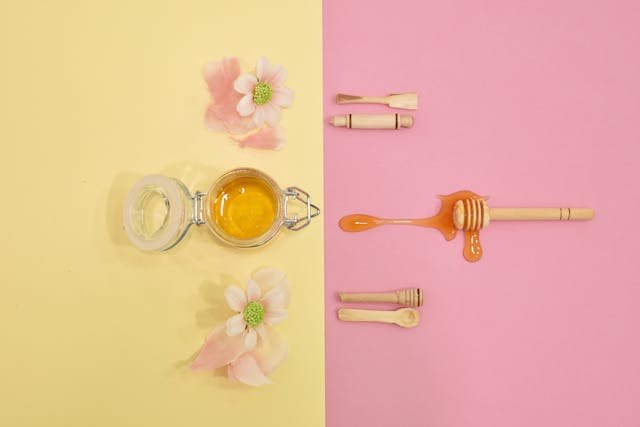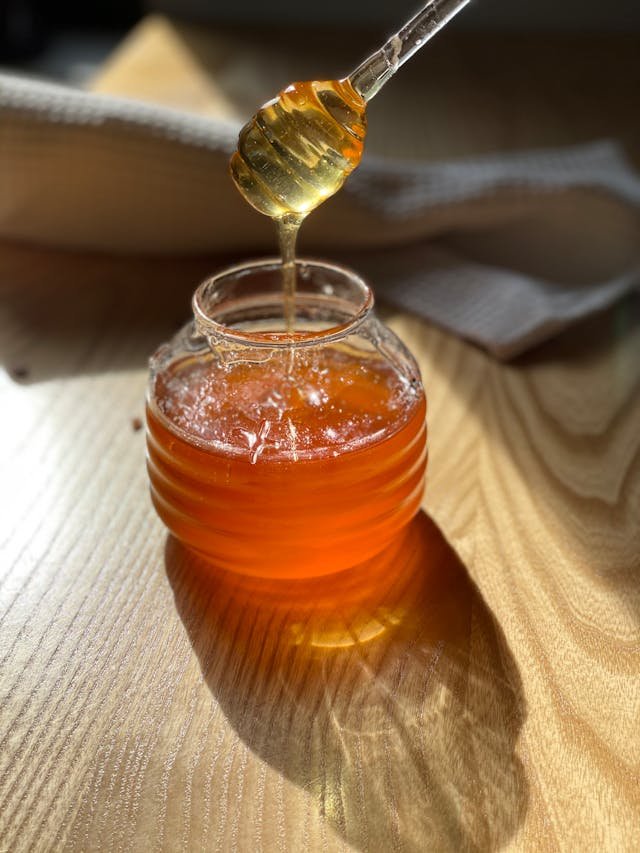Hey there, beauty enthusiasts! Have you ever wondered if the secret to glowing, flawless skin lies in your kitchen cupboard? Enter honey, the golden elixir that has been a skincare staple for centuries. From ancient Egyptian queens to modern-day beauty gurus, honey’s miraculous properties have made it a beloved ingredient in the quest for perfect skin.
In this blog post, we are diving deep into the sweet world of honey and uncovering its incredible benefits for your skin. Whether you are dealing with acne, dryness, or the first signs of aging, honey might just be the natural remedy you need. We will explore the science behind honey’s skincare prowess, compare different types of honey, share DIY recipes, and address common questions and concerns. By the end of this article, you will understand why honey deserves a spot in your daily skincare routine and how to harness its power for a healthier, more radiant complexion. So, let us get started on this honey-infused journey to better skin!
Benefits of Honey for Skin
When it comes to skincare, honey is a true multitasker. This golden nectar offers a myriad of benefits, making it a must-have in any skincare regimen. Let’s delve into the specific advantages that honey brings to the table:
Antioxidant Properties
Honey is rich in antioxidants, which are crucial for protecting the skin from damage caused by free radicals. These free radicals, often a result of UV exposure and pollution, can accelerate aging and lead to wrinkles and fine lines. The antioxidants in honey help neutralize these harmful molecules, keeping your skin looking youthful and vibrant. Think of antioxidants as your skin’s personal defense team, always ready to fend off attacks and keep you looking fresh.
Moisturizing Effects
One of honey’s standout properties is its ability to act as a natural humectant. This means it draws moisture into the skin from the air, providing deep and lasting hydration. Unlike synthetic moisturizers that may sit on the surface, honey penetrates deeply, nourishing your skin from within. This results in a plump, soft, and hydrated complexion—like giving your skin a big, comforting hug.
Antibacterial and Anti-inflammatory Properties
Honey, especially varieties like Manuka honey, boasts powerful antibacterial properties. This makes it an excellent choice for treating and preventing acne. The natural enzymes and hydrogen peroxide in honey help cleanse the skin and inhibit bacterial growth. Additionally, its anti-inflammatory properties can soothe irritated skin and reduce redness, making it ideal for those with sensitive or acne-prone skin.
Healing and Regenerative Effects
The natural enzymes, vitamins, and minerals found in honey can accelerate the skin’s healing process. Whether you are dealing with minor cuts, burns, or acne scars, honey can promote faster tissue regeneration and reduce the appearance of scars and dark spots. It is like having a natural first-aid kit in your skincare routine.
How Honey Works on Different Skin Types
Honey is a versatile skincare ingredient that can benefit all skin types, from oily to dry and sensitive. Its natural properties adapt well to the specific needs of each skin type, providing targeted care and solutions. Let us explore how honey works its magic on different skin types:
Honey for Oily Skin
Oily skin can be challenging to manage, with excess sebum often leading to clogged pores and breakouts. Honey’s antibacterial and antiseptic properties make it an excellent choice for those with oily skin. It helps to balance oil production without stripping the skin of its natural moisture. By gently cleansing and reducing the presence of acne-causing bacteria, honey can help keep your complexion clear and less shiny. Think of honey as a gentle yet effective bouncer, keeping unwanted visitors (like acne) at bay while maintaining peace on the surface.
Honey for Dry Skin
Dry skin craves moisture and nourishment, and honey delivers both in abundance. As a natural humectant, honey draws moisture from the air into the skin, providing deep and long-lasting hydration. It penetrates deeply, soothing dry patches and leaving the skin feeling soft and supple. Imagine giving your skin a drink of water that hydrates it from the inside out. For those with chronic dryness or flaky skin, honey can be a game-changer, restoring a healthy, dewy glow.
Honey for Sensitive Skin
Sensitive skin requires gentle care to avoid irritation and inflammation. Honey’s anti-inflammatory and soothing properties make it a safe and effective choice for those with delicate skin. It can calm redness, reduce irritation, and provide a protective barrier that helps the skin heal. Whether you are dealing with rosacea, eczema, or simply have a reactive complexion, honey’s natural gentleness can provide relief and comfort. Think of honey as a soothing balm that not only heals but also protects sensitive skin from further damage.
How to Choose the Right Honey for Skin
Choosing the right honey for your skin is crucial to reap its maximum benefits. Here is a step-by-step guide to help you select the perfect honey for your skincare needs:
- Understand the Types of Honey
- Brief overview of different types of honey, such as Manuka honey, raw honey, and processed honey.
- Explanation of how each type differs in terms of processing, purity, and potential benefits for the skin.
- Consider Your Skin Concerns
- Identify your specific skin concerns, whether it is acne, dryness, sensitivity, or aging.
- Discuss how different types of honey may address these concerns based on their unique properties.
- Research Authenticity and Quality
- Highlight the importance of purchasing authentic, high-quality honey for skincare purposes.
- Provide tips on how to identify genuine honey, such as checking for certifications, sourcing from reputable brands or beekeepers, and avoiding heavily processed options.
- Read Labels and Descriptions
- Guide readers on how to read labels and product descriptions when purchasing honey for skincare.
- Encourage them to look for terms like “raw,” “unprocessed,” “organic,” and “unfiltered” to ensure they are getting the best-quality honey.
- Consider the Source
- Discuss the significance of the honey’s source, including the region and environment where it was produced.
- Explain how factors like floral sources, climate, and beekeeping practices can influence the quality and properties of honey.
- Look for Additional Certifications and Accreditations
- Inform readers about additional certifications and accreditations to look for when choosing honey for skincare, such as USDA organic certification or Manuka honey grading systems.
- Check for Additives and Processing Methods
- Advise readers to avoid honey products that contain additives, preservatives, or excessive processing.
- Suggest opting for minimally processed honey to retain its natural enzymes, vitamins, and nutrients.
- Consider Personal Preferences and Budget
- Remind readers to consider their personal preferences, such as texture, aroma, and taste, when choosing honey for skincare.
- Provide tips on how to balance preferences with budget constraints, recommending cost-effective options without compromising quality.
- Consult Reviews and Recommendations
- Encourage readers to seek out reviews and recommendations from trusted sources, such as skincare experts, dermatologists, and fellow skincare enthusiasts.
- Offer suggestions for reputable websites, forums, and social media groups where they can find reliable feedback on honey products.
- Perform Patch Tests
- Emphasize the importance of conducting patch tests before applying honey to the entire face or body.
- Provide instructions on how to perform a patch test and monitor for any adverse reactions or sensitivities.
By following these steps, we can confidently choose the right honey for your skincare routine, ensuring that you harness its natural benefits for healthy, radiant skin.
Potential Side Effects and Precautions of Choosing Honey for Skincare
Honey is celebrated for its numerous benefits in skincare, but it is essential to acknowledge that it may not be suitable for everyone. Here, we will explore potential side effects and precautions to consider when incorporating honey into your skincare routine:
Potential Side Effects
Allergic Reactions
While rare, some individuals may be allergic to honey. Allergic reactions can manifest as skin irritation, redness, itching, or swelling. It is crucial to perform a patch test before applying honey to larger areas of the skin, especially if you have a known allergy to bee products.
Irritation and Sensitivity
Even if you are not allergic to honey, it is possible to experience irritation or sensitivity. This can occur due to various factors, including the concentration of honey used, its purity, or other ingredients in skincare formulations. If you notice any signs of irritation, such as redness or stinging, discontinue use and consult a dermatologist.
Precautions
Check for Purity and Quality
When selecting honey for skincare, opt for high quality, pure honey without additives or contaminants. Look for raw or unprocessed honey, preferably sourced from reputable beekeepers or brands. Reading labels carefully and choosing organic or locally sourced honey can help ensure its purity and quality.
Perform Patch Tests
Before applying honey to your face or body, conduct a patch test on a small area of skin, such as the inner arm. Apply a small amount of diluted honey and observe for any adverse reactions over 24 hours. If no irritation occurs, it is generally safe to use honey on your skin.
Avoid Prolonged Exposure
While honey is generally safe for topical use, prolonged exposure may increase the risk of irritation, especially for sensitive skin. Avoid leaving honey masks or treatments on the skin for extended periods. Rinse off thoroughly with lukewarm water after the recommended duration to prevent potential irritation.
Conclusion
Honey is more than just a sweet treat; it is a powerful ally for your skin. In summary, honey is more than just a sweet treat; it is a powerhouse ingredient that offers multiple benefits for your skin. From providing deep hydration to fighting acne and signs of aging, honey can transform your skincare routine and help you achieve a healthy, radiant complexion. While honey offers numerous benefits for skincare, it is essential to be aware of potential side effects and take necessary precautions. By choosing high-quality honey, performing patch tests, and avoiding prolonged exposure, you can safely enjoy the skincare benefits of honey without any adverse effects. As with any skincare product, listen to your skin and discontinue use if you experience any discomfort or irritation. Whether you are battling acne, dryness, or signs of aging, honey has something to offer. So why not try it and experience the magic of honey for yourself? Your skin will thank you.
Frequently Asked Questions (FAQs)
- Can I use honey on my face every day?
Yes, honey is gentle enough for daily use. Just ensure you are not allergic and always patch test first.
- What type of honey is best for acne?
Manuka honey is highly recommended for its potent antibacterial properties, making it ideal for acne-prone skin.
- How long should I leave a honey mask on my face?
You can leave a honey mask on for about 15-20 minutes. This allows enough time for the honey to penetrate and work its magic.
- Can honey help with dark spots?
Yes, honey’s healing properties can help lighten dark spots over time with consistent use.
- Is honey suitable for all skin types?
Generally, yes. Honey is versatile and can benefit all skin types, from oily to sensitive. Always do a patch test to be sure.
- Can honey lighten skin?
Yes, honey is believed to have skin-lightening properties, although its effectiveness may vary depending on individual skin types and conditions.



